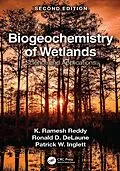The globally important nature of wetland ecosystems has led to their increased protection and restoration as well as their use in engineered systems. Underpinning the beneficial functions of wetlands are a unique suite of physical, chemical, and biological processes that regulate elemental cycling in soils and the water column. This book provides an in-depth coverage of these wetland biogeochemical processes related to the cycling of macroelements including carbon, nitrogen, phosphorus, and sulfur, secondary and trace elements, and toxic organic compounds.
In this synthesis, the authors combine more than 100 years of experience studying wetlands and biogeochemistry to look inside the black box of elemental transformations in wetland ecosystems. This new edition is updated throughout to include more topics and provide an integrated view of the coupled nature of biogeochemical cycles in wetland systems. The influence of the elemental cycles is discussed at a range of scales in the context of environmental change including climate, sea level rise, and water quality. Frequent examples of key methods and major case studies are also included to help the reader extend the basic theories for application in their own system. Some of the major topics discussed are:
- Flooded soil and sediment characteristics
- Aerobic-anaerobic interfaces
- Redox chemistry in flooded soil and sediment systems
- Anaerobic microbial metabolism
- Plant adaptations to reducing conditions
- Regulators of organic matter decomposition and accretion
- Major nutrient sources and sinks
- Greenhouse gas production and emission
- Elemental flux processes
- Remediation of contaminated soils and sediments
- Coupled C-N-P-S processes
- Consequences of environmental change in wetlands#
The book provides the foundation for a basic understanding of key biogeochemical processes and its applications to solve real world problems. It is detailed, but also assists the reader with box inserts, artfully designed diagrams, and summary tables all supported by numerous current references. This book is an excellent resource for senior undergraduates and graduate students studying ecosystem biogeochemistry with a focus in wetlands and aquatic systems.
Autorentext
K.R. Reddy is Professor and Chair of the Soil and Water Science Department, University of Florida. He received his B.S. and M.S. degrees in Agronomy/Soil Science in A.P. Agricultural University, Hyderabad, India. He received his Ph.D. in Soil Science from Louisiana State University. He is a Fellow in the American Association for the Advance of Science, Soil Science Society of America, and American Society of Agronomy. He has over 30 years' experience in the field of Wetland Biogeochemistry. He has over 250 technical reviewed publications in the field. He is listed by ISI Highly Cited and is one of the most highly cited scientists in the Environmental/Ecology field. He served on the Editorial Board of numerous journals in the Ecology, Water Quality, Soil Science, and Wetland fields. His research interest included biogeochemical cycling of nutrients and other contaminants in wetlands and aquatic systems, as related to ecosystem functions and water quality included internal nutrient loading and cycling in shallow lakes, biogeochemical and ecological indicators, design and evaluation of constructed wetlands, greenhouse gases and carbon sequestration in wetland ecosystems. He has promoted interdisciplinary research, teaching and extension programs with other disciplines including ecology, limnology and hydrology.
R.D. DeLaune is Professor in the Wetland Biogeochemistry Institute and Department of Oceanography and Coastal Science, School of the Coast and Environment, Louisiana State University. He received his B.S. and M.S. in Soil Science from the Department of Agronomy at Louisiana State University. He received his Ph.D. in Agricultural Sciences from Wageningen University, The Netherlands. He is a fellow in the Soil Science Society of America. He has more than 300 scientific publications. He is listed by ISI Highly Cited as one of the most highly cited scientists in the Environmental/Ecology field. He has served or is currently on the editorial board of the f
Inhalt
Introduction. Basic Concepts and Terminology. Electrochemical Properties. Carbon. Oxygen. Adaptation of Plants to Soil Anaerobiosis. Nitrogen. Phosphorous. Biogeochemistry of Iron and Manganese. Sulfur. Metals/Metalloids. Toxic Organic Compounds. Soil and Floodwater Exchange Processes. Rice Production Systems. Constructed Wetlands. Stream Sediments. Biogeochemical Indicators. Wetlands and Global Climate Change. Freshwater Wetlands: The Everglades. Coastal Wetlands: Mississippi River Deltaic Plain Coastal Marshes, Louisiana. Advances in Biogeochemistry. References. Index.
